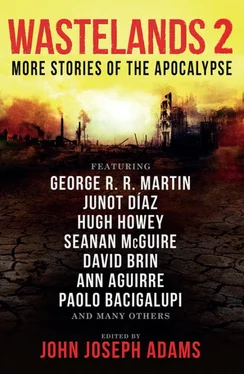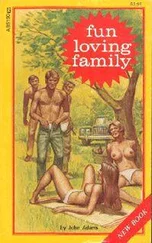The two strange apertures in his head, behind the eyes, before the ears, seeped with fluid now and then. He stank sometimes, and the stench came from there. At the time we did not know what to call these things, or what they meant, for the elephants had not yet come. The whole community liked Arek, as they must always like children; they played with him, answered his questions, watched over him. But beneath the love there was a constant gnawing pain. He was our hope, but he was no hope at all. Whatever his strange condition was, it might have made him quicker than a normal child, but we knew that it could not be healthy, that like most strange children he would no doubt die before his time. And definitely, mutant that he was, he must surely be as sterile as a mule.
And then the elephants came, great shadowy shapes out in the distant fields. We marveled. We wondered. They came nearer, day by day. And Arek became quite agitated. “I hear them,” he said.
Hear what? We heard nothing. They were too far off for us to hear.
“I hear them,” he said again. He touched his forehead. “I hear them here.” He touched his chest. “And here.”
The flow from the apertures in his head increased.
He took to wandering off. We had to watch him closely. In the middle of a reading lesson, he would stand up and face the distant elephants—or face the empty horizon where they might be—and listen, rapt. “I think I understand them,” Arek said. “Here’s a place with good water.”
All of Poland has good water now, I pointed out.
“No,” he said impatiently. “It’s what they said. And now they talk of one who died. They have the scent of him. The one who died.” He listened more; I still heard nothing. “And me,” he said. “They have the scent of me.”
Elephants care nothing for you, I said.
He turned to me, his eyes awash with tears. “Take that back,” he said.
Sit and do your lessons, Arek.
“What do I care what dead people say? I have no need of what they said!”
You’re five years old, Arek. I know better than you what you need to know.
“Your father had to know all this,” he said. “But what is it to me? What good has reading done for you?”
I tried to hold him, but at five years old he was too strong. He ran from the room. He ran out into the field. He ran toward the elephants.
I followed him as best I could. Others joined me, calling out Arek’s name. He was not swift, and we could have caught him if we were willing to tackle him like rugby players. But our goal was only to keep him safe, and so we jogged alongside him, his short and heavy legs lumbering forward, ever closer to the elephants. A matriarch and her clan, with several babies of varying sizes. We tried to stop him then, to hold him back, but by then the matriarch had noticed us, and as she approached, Arek screamed and tried more violently to get away, to run to her. She trumpeted at us, and finally, tentatively, in fear of her we set him down.
She let him embrace her trunk; he clambered upward, over her great impassive brow, and sprawled his body across the top of her head. Her trunk reached up to him; I feared that she would sweep him from her head like lint. Instead she touched the leaking aperture on his right cheek, then brought the tip of her trunk down to her mouth. To smell and taste it.
That was when I realized: The matriarch, too, had an aperture between eye and ear, a leaking stinkhole. When I did my reading, I learned that it was the temporal gland. The elephants had it, and so did my son.
Neither Hilde nor I was elephantine. Nor was there any logical way, given the little science that I knew, for me to explain how a gland that only elephants had should suddenly show up on a human child. It wasn’t just the temporal glands, either. As he sat perched atop the matriarch, I could see how closely his brow resembled hers. No great flapping ears, no abnormality of nose, and his eyes were still binocular, not side-aimed like the elephant’s. Yet there was no mistaking how his forehead was a smaller echo of her own.
He has been waiting for them, I murmured.
And then I thought, but did not say: They came in search of him.
He would not go home with me. One by one the others drifted back to our village, some returning to bring me food and offer food to Arek. But he was busy riding on the matriarch, and playing with the babies, always under the watchful gaze of the mothers, so that no harm would come to him. He made a game of running up the trunks and turning somersaults onto an elephant’s back. He swung on tusks. He rode them like horses, he climbed them like trees, and he listened to them like gods.
After two days they moved on. I tried to follow. The matriarch picked me up and put me back. Three times she did it before I finally acquiesced. Arek was their child now. They had adopted him, he had adopted them. Whatever music they were making, he heard it and loved it. The pied piper had come to lead away our only son, our strange inhuman child, the only hope we had.
From that day I did not see him, until the twelfth bull elephant arrived with Arek astride his neck.
Full-grown Arek—just a little taller, I estimated, than his father, but built like a tractor, with massive legs and arms, and a neck that made his enormous head look almost natural. “Father!” he cried. “Father!” He had not seen me at the window. I wanted to hide from him. He must be fifteen now. The age I was when I met Hilde. I had put him from my mind and heart, as I had already done with my parents, and my baby sister, whom I had left behind unburied when I was too hungry to wait any longer for them to wake again, for God to raise them up from their sickbeds. Of all those I had lost, why was he the one that could return? For a moment I hated him, though I knew that it was not his fault.
He was their child anyway, not mine. I could see that now. Anyone could see it. His skin was even filthy grey like theirs.
He didn’t see me. He slid down the brow and trunk of the bull he was riding and watched as his steed—his companion? His master?—took its place in the circle that pushed against the walls of the ugly building. He walked around them, a wide circle, looking up at the windows on the opposite side of the square. But it was not by sight that he found me. It was when he was directly under my window, looking the other way, that he stopped, and turned, and looked up at me, and smiled. “Father,” he said. “I have seen the world!”
* * *
I did not want him to call me father. Those were his fathers, those bull elephants. Not me. I was the bearer of the seed, its depositor, but the seed itself had been planted in both Hilde and me by the plague. Born in Africa and carried to the world on airplanes, virulent and devastating, the plague was no accident of nature. Paranoid as it sounded even to myself, I had the evidence of Arek’s elephantinism to bolster what I knew but could not prove. Somehow in the kettle of the temporal gland, the elephants created this new version of man, and sent the seed out into the world, carried by a virus. They had judged us, these beasts, and found us wanting. Perhaps the decision was born as grieving elephants gathered around the corpses of their kinfolk, slain and shorn of their tusks. Perhaps the decision came from the shrinking land and the drying earth. Perhaps it was their plan all along, from the time they made us until they finally were done with us.
For in the darkness of the library, as I moved along the table, keeping my yellowing books always in the slant of light from the window, I had conjured up a picture of the world. The elephants, the true gods of antiquity. They had reached the limit of what they could do with their prehensile noses. What was needed now was hands, so virus by virus, seed by seed, they swept away one species and replaced it with another, building and improving and correcting their mistakes. There was plenty of the primate left in us: the baboon, the chimpanzee. But more and more of the elephant as well: the kindness, the utter lack of warfare, the benevolent society of women, the lonely wandering harmless helpful men, and the absolute sanctity of the children of the tribe. Primate and elephant, always at war within us. We could see the kinship between us and the apes, but failed to see how the high-breasted elephant could possibly also be our kind.
Читать дальше












